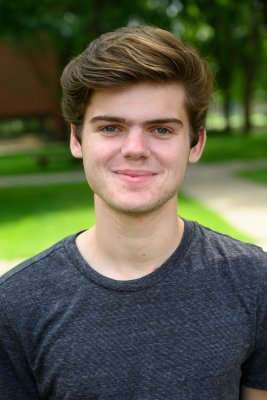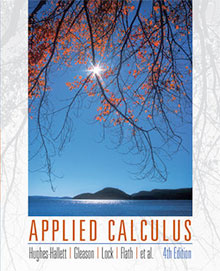Math 211
Calculus I
Syllabus, Fall semester 2022(-2023)
Calculus is the mathematics of change.
Any field that studies change can benefit from the vocabulary and the toolbox of calculus.
In the site banner...
A visualization of change: The Trift glacier in Switzerland has been retreating in response to climate change. An artist flew a drone with a strong LED and took long-exposure photographs to "paint" each blue line, which outlines the extent of the glacier in a previous year.
- How does a quantity change with respect to other quantitites on which it depends? E.g. the quantity of drug in a patient's bloodstream depends on the time after injection...
- What is the average rate of change and the instantaneous rate of change?
- For a trip, given a varying speed (rate of change of distance with time) how to calculate the total distance travelled?
These questions arise in physics, chemistry, biology, economics, psychology, engineering, medicine and other fields.
Catalog description
Concepts of calculus emphasizing applications in the natural and social sciences. Topics include differential calculus of one and two variables, integration, and differential equations. Prerequisites: three and one-half units of high school mathematics including trigonometry or Math 170.
Learning objectives
By the end of the course, students will be able to do the following:- Describe and manipulate linear, power, polynomial, trigonometric, exponential, logarithmic, piecewise, combined, composed, and (some) multivariable functions.
- Relate and use symbolic, graphical, numeric, and verbal representations of functions.
- Use differentiation, antidifferentiation, integration, and separable differentiable equations to solve pure and applied problems.
- Use technology to investigate, visualize, and solve calculus problems.
- Learn mathematics by reading, liistening, exploring, and conversing in an effective manner.
- Explain mathematical reasoning, orally and in writing.
Class meets MWF, noon-12:50 MWF in SC 107.
Labs are Thursdays in GL 102, either 11:00-12:15 -or- 12:30 pm to 1:45.
Prerequisite: A grade of C or higher in Math 170 (Functions, Data, Models), or B or better in 3 years of high-school mathematics, including precalculus or advanced math. An SAT math score of at least 600 or ACT math score of at least 26 is highly recommended.
Instructors
 Professor Paul Meyer Reimer
Professor Paul Meyer Reimer
Sci 011 · +1.574.535.7318 (ofc)
paulmr@goshen.edu ·
+1.574.533.3995 (cell)
I don't have fixed office hours. You are welcome to stop by my office (SC 011) any time!

If you are off campus and want to make sure I'm available before coming to campus You may e-mail or text me to make a time to get together.
Do not worry that you're "bothering me" when you stop by! Every time a student stops by it makes a good impression on me, and I think "Oh, they are taking charge of their own learning, and are taking the class seriously!".
 Samuel Stoner-Eby,
Teaching Assistant,smstonereby@goshen.edu
Samuel Stoner-Eby,
Teaching Assistant,smstonereby@goshen.edu
Samuel will be running the study sessions.
Course resources and materials
-
 Required:
Applied Calculus, by Deborah Hughes-Hallett, Patti Frazer Lock, et. al., 4th edition (Wiley, 2009).
ISBN 10: 0470170522 ISBN 13: 9780470170526
(Paperback, at Alibris).
Required:
Applied Calculus, by Deborah Hughes-Hallett, Patti Frazer Lock, et. al., 4th edition (Wiley, 2009).
ISBN 10: 0470170522 ISBN 13: 9780470170526
(Paperback, at Alibris).
 Required:
We will be using Edfinity for homework assignments.
To enroll please follow these steps:
Required:
We will be using Edfinity for homework assignments.
To enroll please follow these steps:
- If you receive financial aid for books and supplies from GC, Go to our GC Akademos site to purchase Edfinity access (\$33.33). This is the only way to take advantage of your financial aid to purchase Edfinity access!
- If you pay for your own books and supplies you can enroll in Edfinity directly, paying online by following the steps below. You will have a 2-week grace period after registration in which to pay their fee of \$25.00 (?)
- If you already have an Edfinity account from a previous course, please sign into it. Otherwise, start at step 2.
- Go to the following registration link: edfinity.com/join/7UCY8BXM. You should see something like "Math 211 Calc I @ GC · Fall 2022".
- You will be prompted to pay (but 2 week grace period) and enroll in our section.
- Start working on your assignments :)
- Non-graphing, scientific calculator - For exams and quizzes you may not use a graphing calculator. A "scientific" calculator usually has trigonometric and logarithmic functions. For example, the TI-30X or Casio 260 are fine and run between $10-20.
- Wolfram Alpha app. This paid app is available on your GC-registered iPad for free if you go to the GC App Catalog On your laptop or desktop you can use the web service at: <wolframalpha.com>.
- Binder: A one-inch three-ring binder with loose-leaf lined and graph paper is recommended so that you can keep printed copies of course resources and a written record of problem solving attempts, questions, math concept and technique discoveries, and skill assessments.
- We'll use several different computer graphing / calculation packages. Sign up for an account for each of these! Each of these services is free to you. (The Math department is picking up the cost of using CoCalc):
- CoCalc. It's important to use your Goshen College e-mail address as your username. Follow these instructions to sign up for an account on cocalc.com, and work through the instructions to Create your first notebook. We'll use Jupyter notebooks for most labs, which allow you to combine writing math (LaTeX and markdown) with calculations (SageMath) and data analysis (SageMath, R, much more...). Hey, you can use them for any other class in which you're doing calculations too!
- Desmos for exploring the graphs of functions of a single variable and fitting data to models. Make yourself an account. Then, work through this Intro to Desmos for graphing and data modelling.
- Geogebra for exploring graphs of functions of more than one variable.
- Class website: with a general schedule, course documents, lecture notes. Follow the link and then bookmark the site at people.goshen.edu: If you're asked for a username and password, respond with your GC username (usually it's your GC e-mail address minus '@goshen.edu'), and your GC e-mail password.
- Gradebook: and some other course material on Moodle
- E-mail: read your @goshen.edu e-mail at least daily.
Class activities, attendance, study
An average student can expect to earn an average grade with 12-16 hours per week (including class and lab time). You will need to adjust this if you are not average, or desire a grade that is not average. See the math-dō page for concrete suggestions and considerations.
You are expected to attend class every day and to actively participate in class activities.
This year we have funding to run You are expected to come to class prepared. This means that you should have read the sections to be covered and should be prepared to ask questions about the reading and the problems you are asked to do.
You should be prepared to do problems and take part in class discussions and in class problem solving. Attendance in class and in the study sessions is reflected in the 'participation' part of your semester grade.
minimum grade outcomes: Grades are intended to reflect the degree to which the mathematical content has been mastered - not the performance of one student in relation to others.
Exhibit your ability to solve problems without assistance or collaboration.
If you score better on the final exam than your lowest semester exam, your final exam grade will replace your lowest semester exam grade.
Many Fridays there will be a five-minute closed book / closed notes
exercise to test your mastery of the material. There may also be
occasional reading quizzes given in class (no access to books) or
on-line ahead of class (access to the texbook allowed).
You will use technology and collaborate with others on more substantive
explorations in the lab. You will develop and refine your written communication skills through reports.
Achieve and exhibit understanding by completing the assigned exercises.
Homework in Edfinity will be assigned in nearly every class, and due by 7 PM after the following class, so that you have a chance to ask questions in the next class before it's due.
At least 2, and at most 3 assignments will be video homework, in which you record a video of yourself explaining an assigned homework problem.
I encourage you to collaborate with other students and seek
assistance from each other on the homework problems. Invite
others to join you in problem solving. Invite those who are
socially less connected to join you. Invite those who are socially more connected to join you.
You may also consult other resources / web pages / past students from this class / tutors. Answers to odd problems in the textbook are available in the back of the book.
Your goal is to be able to
explain to someone else how you solved each problem in each assignment.
For exams and quizzes, you may not use any resources unless a specific exception is stated by the instructor.
The Academic Resource and Writing Center offers tutoring
and writing assistance for all students. For further information please see www.goshen.edu/studentlife/arwc/. Goshen College wants to help all students be as academically successful as
possible. If you have a disability and require accommodations, please contact
the instructor or Director of the Academic Resource and Writing Center, Lois
Martin, early in the semester so that your learning needs may be appropriately
met. In order to receive accommodations, documentation concerning your disability
must be on file with the Academic Resource and Writing Center, GL113, x7576,
lmartin@goshen.edu. All information will be held in the strictest confidence.
Monday 29 Monday 5 Friday 16 Wednesday 21 Wednesday 28 Friday 14 Monday 17 Thursday 27 Wednesday 23 Wednesday 30 Thursday 1 Monday 5 Tuesday 6 Friday 9 Grading
homework / participation
15%
quizzes
10%
labs
16%
3 exams
39%
final exam (comprehensive)
20%
A/A- 93%/90
B+/B/B- 87%/83/80
C+/C/C- 77%/73/70
D+/D 67%/60
F < 60% Exams
Quizzes
Labs
Homework
Video homework (VHW)
Collaboration & Academic Integrity
Tutoring
Disabilities
Schedule & Topics
noon, Our first class in Science 107
Labor Day, no class
Bring your computer or iPad
Also Quiz: functions, linear, log, exponential
Exam 1
Community Engagement day, no class
No class
Midterm break through Tues Oct 18
No class
Exam 2 (during Labs)
Thanksgiving break through Fri Nov 25
6 PM, Engineering info + Pizza, SC 203
Exam 3 (During lab times)
Last day of classes
Reading day
Please complete your course evaluations.
Final exam, 3:30 PM